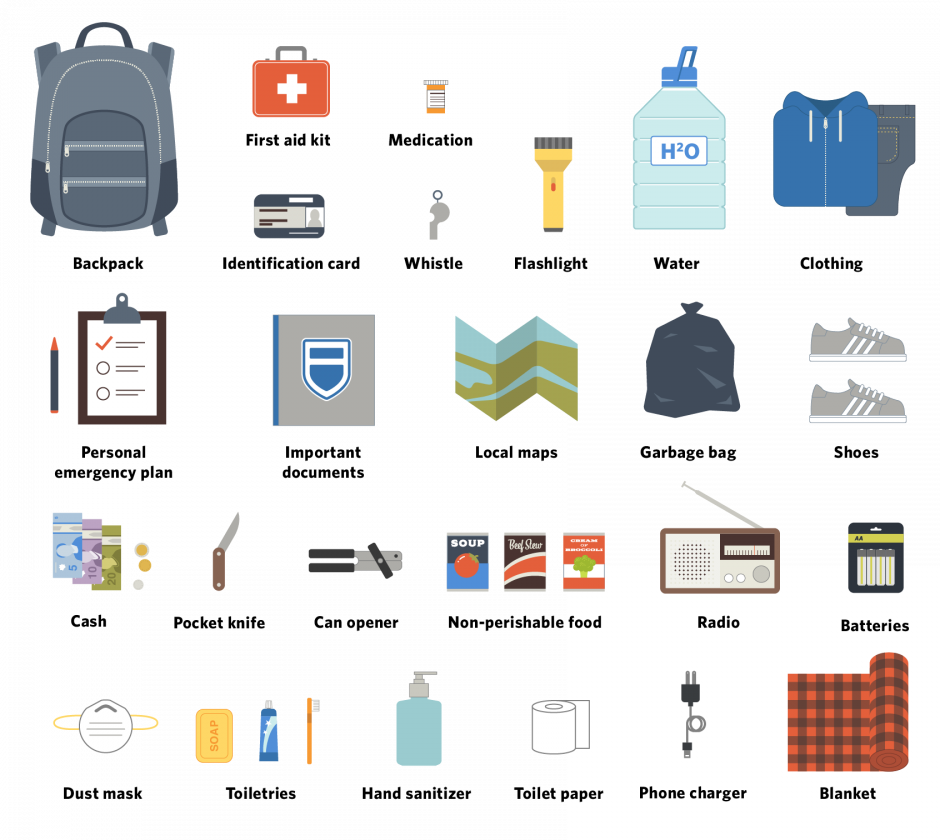An emergency can occur at any time and without warning, it’s important to prepare before it’s too late. Be prepared by equipping yourself with the knowledge and tools to prevent, respond, and recover from any and all emergencies. Being prepared is both an individual and an organizational responsibility, so let’s work together.
For several days after an emergency, while first responders and the university manage the aftermath, you and your family could be on your own — it’s going to take us a while to set up our mass care supports. So get prepared. Make a plan and make a kit.
Download UBC’s Emergency Preparedness Guide
Download UBC’s Students in Residence Emergency Preparedness Guide
Download University Neighbourhoods Association (UNA)’s Emergency Preparedness Guide
Make a Plan
Knowing what to do in an emergency will reduce anxiety and help keep you focused and safe.
To make a plan for how you will respond to a disaster, start by compiling vital information that you will need to help you manage in an emergency:
- A list of important personal contacts — choose a primary contact person (Listen to the radio or TV for phone-use instructions, then call your contact person to say how you are, where you are, and what your plans are. Keep the call short and, if possible, arrange to call back at a specified time for another check-in).
- One out-of-province contact (After a major disaster, local phone service may be limited, so phone your out-of-area contact to keep in touch with your family).
- A local meeting place for family and friends to convene after an emergency.
- A designated person who can pick up children, if you are unable.
- A designated person who can check in on pets, if you are unable.
For household, family, and pet planning, click here to take advantage of these helpful resources.
Planning for People with Disabilities
If you are a person with a disability or if you are preparing to help someone with a disability, visit the Disability Alliance website and take a look at the Personal Preparedness Checklist to assist you with the planning process. Please take the time to look through the entire Prepare to Survive: Prepare to Help planning document and explore Prepared BC for more resources.
Additional considerations
- Your ability to communicate may be restricted.
- Your surroundings may change and look unfamiliar.
- Your service animal or guide dog may be hurt or frightened.
- Your health may be impacted by stress or confusion.
Most importantly, take time to create a trusted list of at least three people to assist you during an emergency. Add their contact information to a department emergency plan. You should also advise members of your personal support network of any health conditions or medications, and make sure to show them how to operate specialized medical or mobility equipment.
Local phone lines may be jammed in an emergency. Have a designated contact outside of town, someone each family member is instructed to check with to let them know you are safe. Everyone may be using the phone at the same time, so making a long-distance call is actually easier.
^ Back to Top
Make a Kit
Having an emergency kit is invaluable after a disaster, and building your emergency kit doesn’t need to be expensive or take a lot of time.
Here are some of the basic supplies you should consider having in your emergency kit:
- First aid kit and medications
- Four litres of water per person per day for at least three days
- At least a 72-hour supply of non-perishable food and a manual can opener
- Battery-powered or hand-crank radio and a NOAA Weather Radio with tone alert, and extra batteries for both
- Battery-powered or hand-crank flashlight with extra batteries
- Whistle, to signal for help
- Cell phone with chargers, inverter, or solar charger
- Local maps (identify a meeting place)
- Cash in small bills
- Garbage bags, moist towelettes, and plastic ties for personal sanitation
- Dust mask
- Seasonal clothing and footwear
- Blanket
- Personal toiletries
- Copies of important personal documents
- Multi-tool or a pocket knife
Emergency kits can be purchased at the UBC Bookstore.
Departmental Readiness
Although supplies are important, the planning around building kits is even more beneficial to creating an internal culture of readiness. Start a conversation with faculty and staff, and encourage them to think in a holistic way about office preparedness.
Here are a few things everyone should consider when planning for an emergency:
- Have an emergency phone list with important personal and professional contact information — make sure you have a paper copy.
- Know the designated meeting spot for faculty and staff.
- Know to check ubc.ca for official sources of information.
- Know your work responsibilities in an emergency.
- Keep paper copies of critical documents that you may need to continue to work in an emergency.
- Make sure you have on hand a proper supply of anything special you may need, such as medication, a small amount of food, water, and cash.
While there are no policies or legislation that require each department/faculty to practice workplace preparedness, everyone should have a personal preparedness kit at home and at work. First Aid kits are also no longer required in your department, however, first aid supplies are still important to have in your emergency kit.
^ Back to Top
Continuity Planning
Activities at UBC typically depend on specialized equipment, supplies, support services, and of course, highly skilled and knowledgeable people. In the event of a breakdown or disruption in any one of these elements, academic, research and operational activities could be impacted. As prolonged failures in some of these areas may cause risks to human life or significant harm to campus infrastructure and services, it’s important to make continuity plans to mitigate against the risk of this happening.
Objective
The objective of continuity planning is to ensure the continuation of critical university services including teaching and research for an extended duration of time following an initial emergency or threat. The duration of time may range from a few hours to many days or even months. Under UBC Policy SC10, Disaster Management, service units are charged with conducting or delivering critical services to the university under the following conditions:
- Workforce Disruption – disruption involving personnel such that sufficient, trained and skilled personnel are not available.
- Workplace Disruption – any disruption of a business entity (office, teaching facilities, utilities).
- Disruption of IT Services – any disruption affecting access to IT Services.
- Supply Chain Disruption – any external supplier, service provider, utility or logistic disruption that stops the movement of critical products and/or services.
Resources
You can find resources to help with business continuity planning in UBC’s three main areas of activity:
Academic Continuity Planning template
Operational Continuity Planning template
Research Continuity Planning template
Minimizing Exposure to Risks
Continuity planning seeks to minimize certain exposures to risks that may impact the recovery and resumption process, including:
- The number of decisions that must be made following a disaster or severe disruption.
- Single point of failure conditions in the unit.
- Dependence on the participation of any specific person, or group of people, in the recovery process.
- The lack of available staff with suitable skills to affect the recovery.
- The need to develop, test, or debug new procedures, programs or systems during recovery.
- The adverse impact of lost data, recognizing that the loss of some transactions may be inevitable.
If you have any questions or require assistance with continuity planning email ready.ubc@ubc.ca
Prepare your home
Is your home ready for an emergency? Safety is a priority for all of our students, staff, faculty, and visitors at UBC. In addition to understanding the plans, procedures, and resources that are in place on campus, we also want to ensure that your home is ready for any emergency that comes your way.
Do I really need to get ready?
Yes! When the unexpected happens, access to important resources can be restricted. Planning ahead and being self-sufficient will help keep you and your loved ones safe.
Being prepared also lessens the burden on emergency response teams (including UBC’s), so they can focus on supporting the most vulnerable people in our communities and getting back to providing core services.
We all have a part to play in emergency preparedness, getting ready helps you, your family and friends, and the wider UBC community.
Emergency-proof your home
No home can ever be completely emergency-proof, but there are some things you can do to make it safer in the event of an emergency:
- During earthquakes, many injuries are caused by falling objects. To avoid this, secure heavy furniture, like bookcases or shelving units, in place.
- Avoid placing heavy items on high shelves, where they could fall and cause damage.
- Think about the locations of hanging lights, pictures, and mirrors. What would be the impact if they fell?
- Store some bottled water. Water from your plumbing system won’t be drinkable after an earthquake unless boiled, but you can still use it for washing or flushing.
- If you experience flooding in your home as a result of an earthquake, stay out of any standing water. Electrical currents, raw sewage, or unseen hazards may be present.
- Always identify where your shutoff valves for gas and water are, after an earthquake you may need to shut them off.
Make an emergency plan
Preparing your home is a great way to get ready for an emergency, but ensuring you have an emergency plan in place is an even better way to protect yourself and your family.
Emergencies situations are typically distressing, which can make good decision-making difficult. Thinking about your response actions and making a plan before you need to will probably yield better results.
Write your plan down, and keep a couple of copies at home, at work and in the car just in case.
Your plan starts with you
- What are the things you absolutely need?
Do you wear glasses or take medication? Make sure these important things are mentioned in your plan, even if you always carry them. - Where are you likely to be?
Your plan should include common locations like home, work, school etc. where you’re most likely to be when an emergency happens Think about how your travel to and from these destinations and how that might be impacted. - Who is in your plan?
Your plan should include the people you most care about, whether they are your family, friends or pets. Think about how independent they are, how you might get to them or even just get in touch. It’s a good idea to ensure those included in the plan are familiar with it.
Location
Where you’re based has a big impact on what your plan should include.
|
Think about where you are in the world. What are some of the likely hazards in your region? For example, in BC we’re at risk of earthquakes, wildfires and floods.
|
Next think about your neighbourhood. Are you reliant on bridges or tunnels when travelling to and from your home/work? Are you based at the top of a steep hill or next to a body of water? |
Finally your immediate surroundings. What access routes do you have into and out of your building? How do you shut off the gas/water?
|
Make an emergency kit
Once you have an emergency plan, and you know how you’re going to look after yourself and your family, THEN you can build an emergency kit according to you plan.
Your kit should be tailored to meet your plan, but there are some common items you are likely to find in all emergency kits.
Remember that information is an important part of any emergency kit. Hard copies of important information like phone numbers, directions and your plan itself is always a good addition.
Keep your kit and other supplies somewhere safe and convenient in your home. In an emergency, you may need to stay at home with your emergency kit or leave immediately with grab-and-go bags.
It’s easy to include as much as possible in your kit, but remember that you may have to take it with you if you need to leave your home, so try not to overpack.
For more information on earthquake and emergency preparedness, visit:




